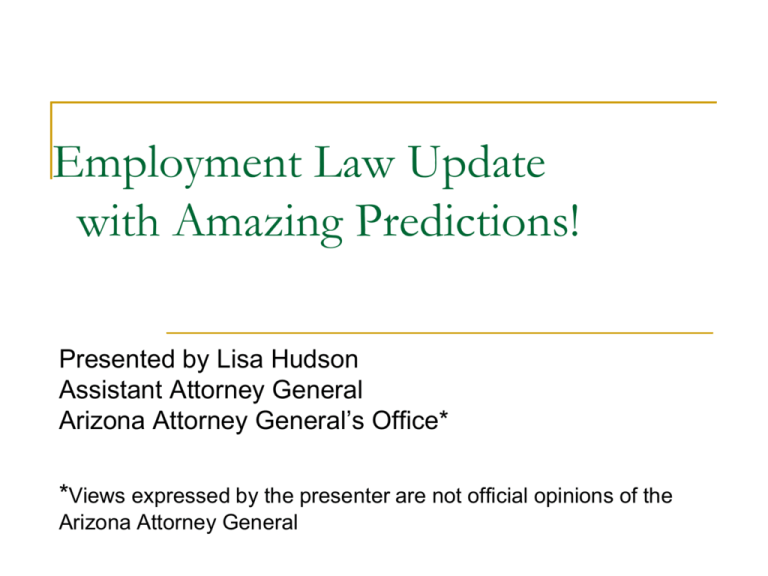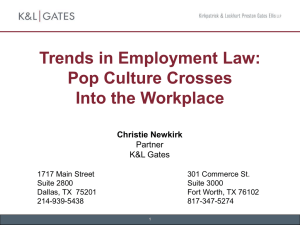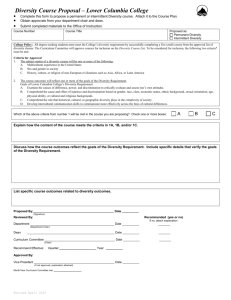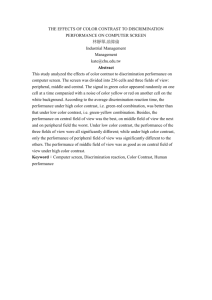
Employment Law Update
with Amazing Predictions!
Presented by Lisa Hudson
Assistant Attorney General
Arizona Attorney General’s Office*
*Views expressed by the presenter are not official opinions of the
Arizona Attorney General
Proposed ADA Regulations from EEOC
EEOC must implement regulations consistent
with the ADA Amendments Act of 2008
Proposed regulations have been issued.
Comment period expired on November 23, 2009.
Examples of “major life activity” expanded, even
beyond the Act.
“Interacting with others” added to the list (this was
not included in the ADA Amendments Act).
Major bodily functions as “life activities”
Expands beyond the ADA Amendments Act
Functions of the immune system, special sense
organs and skin; normal cell growth; and the
digestive, genitourinary, bowel, bladder,
neurological, brain, respiratory, circulatory,
cardiovascular, endocrine, hemic, lymphatic,
musculoskeletal and reproductive functions.
“Substantially limits”
Use a common sense standard not a medical one.
Even impairments that last less than six months
can meet the definition.
Certain impairments will “almost certainly” meet
the definition of a disability:
These include deafness, blindness, intellectual disability,
missing limbs, mobility impairments requiring the use of
a wheelchair, autism, cancer, cerebral palsy, diabetes,
epilepsy, HIV or AIDS, multiple sclerosis, muscular
dystrophy.
Also includes psychiatric disorders such as major
depression, bipolar disorder, post-traumatic stress
disorder, obsessive-compulsive disorder, and
schizophrenia. The list is not exhaustive.
Working as a major life activity.
The current regulations and case law provide that the
inability to work a particular job is not a disability unless the
employee is unable to perform a class of jobs or a broad
range of jobs in various classes.
In a significant change, the proposed regulations provide
that an impairment substantially limits the major life activity
of working if it substantially limits an individual's ability to
perform, or to meet the qualifications for, the type of work at
issue.
Rohr v. Salt River Project, 2009
555 F.3d 850 (9th Circuit)
Is Mr. Rohr a “qualified” individual with a
“disability?”
Type-2 Diabetes—required dietary restrictions,
testing of his blood, and medications that had to
adjusted around his eating
Due to condition, could not pass a “respirator test”
required by SRP.
District Court of Arizona said “not a disability” and
“not qualified individual.”
Rohr v. SRP, Cont.
9th Circuit reversed and said “send it to a jury”
Limitations on eating, scheduling of food,
adjusting of medications could be a substantial
limitation of a major life activity
Respirator test required by SRP not necessarily
an “essential function”
NOT required by OSHA standards
SRP did not consider other testing methods
Use of a respirator may not have been necessary for Mr.
Rohr to do his job
Amazing ADAA
Predictions
• Case law and employer focus will move
from determining whether someone has a
disability, to the issue of accommodation.
• We will see more challenges to “essential
functions.”
• Employers will see an increase in requests
for accommodation of psychological and
psychiatric disabilities.
Tips
Update job descriptions and “essential functions.”
Carefully analyze any physical requirements or tests
for positions. Are they really required to perform the
essential functions?
Review your procedures for requesting
accommodation and engaging in the interactive
process. Streamline and reduce delays.
FMLA- Intermittent Leave Traps –
Carefully evaluate certifications from health
care providers to make sure that you have
sufficient information to grant or deny the
request.
It’s OK to verify authenticity.
Once granted, don’t forget to follow up
periodically.
Is the leave being used consistently with the
certification?
Have you calendared the end date or
recertification date?
Smith v. Hope School, 560 F.3d 694
(7th Cir. 2009)
Ms. Smith worked at a school for kids with
developmental disabilities
After being assaulted twice by the kids, she
became very anxious and fearful
She was moved to the Dietician’s Office (no youth
contact)
Leaves work from stress one day soon after transfer;
gets physician certification for FMLA leave from her
doctor: Smith has “severe recurrent muscle tension and
neck and arm pain secondary to trauma (assaults)
suffered at work”
Smith adds to it herself below doctor’s
writing: “plus serious depression.” Then
submits certification to employer.
Employer calls Dr. because handwriting
doesn’t match. Dr.: “I never diagnosed
depression.”
FMLA denied due to falsified certification.
Smith refuses to come back to work, is
terminated for absence without leave.
Note: she is not fired for falsifying physician’s
certification; just for being absent without
approved leave.
She sues under FMLA. Her point: even without
her “addition” to the physician certification, it
would have qualified her for FMLA.
Court: disagrees with her. “Why should employer
have to figure out what is true and what is false on
a physician’s cert.?” It contained false
information, was invalid, and the employer was
within its’ rights to deny her FMLA leave request.
Carmona v. Southwest Airlines, ___ F.3d ___,
2010 WL 1010592 (5th Cir. March 22,
2010).
Carmona was a flight attendant for Southwest
Airlines.
Suffered from psoriasis and psoriatic arthritis
During flare ups that occurred 3-4 times per
month and lasted 3-4 days per occurrence,
Carmona had difficulty walking or moving
around without great pain.
FMLA Intermittent Leave
Carmona received intermittent leave under
FMLA from 1998 until April 2005. At that
point, he had not worked the requisite 1,250
hours in the previous year to qualify for
FMLA.
Carmona was terminated in June 2005 when
he accrued excessive “attendance points”
under Southwest’s attendance policy.
ADA Claim
Carmona sued under the ADA and obtained
a jury verdict in his favor.
Southwest argued that Carmona was not a
“qualified individual” because he could not
comply with Southwest’s attendance policy.
In other words, regular attendance is an
essential function.
Surprising result!
The court rejected Southwest’s argument that
attendance was required, because Southwest
had granted Carmona’s prior intermittent
FMLA requests.
“If Southwest had denied Carmona’s request
for intermittent FMLA leave, it might have had
a strong argument that as a matter of law
Carmona was not qualified . . .”
Question:
On what basis could Southwest have denied
the Plaintiff’s FMLA requests for intermittent
leave?
Lisa Hudson’s opinion: The court got this
wrong. An employer may not deny
intermittent FMLA leave based on an
attendance policy or requirement.
Amazing Prediction!
• As government employers
continue to struggle with
budget issues, they will see an
increase in requests for
intermittent FMLA leave.
• Employees may feel a greater need to
obtain protection for frequent
absences, lest they be used to justify
a termination of layoff.
FLSA Hot Issues
“Donning and doffing”- When do preliminary
and post-liminary activities constitute
compensable work time?
Bamonte v. City of Mesa, ___ F.3d ___ (9th
Cir. March 25, 2010) (Police officers not
entitled to compensation for the time it takes
to put on and take off uniform and other
required gear. They were permitted to
perform these tasks at home.)
Allen v. McWane, ___ F.3d ___ (5th Cir.
January 8, 2010) (Manufacturing plant
workers not entitled to compensation for
donning and doffing protective gear where
custom and practice was not to pay under
CBA.)
Foods Sepulveda v. Allen Family, ___ F.3d
___ (4th Cir., December 29, 2009) (FLSA
allows unions and employers to negotiate
compensability of time it takes to change
clothes. Poultry processors not entitled to
compensation for donning protective gear).
Amazing Prediction
• With furloughs and layoffs, we
will see an increase of claims
related to “off clock” work.
FLSA Tips
Revisit time-keeping and overtime policies.
Make sure that you are carefully tracking and
enforcing work hours for non-exempt
employees, especially telecommuting
employees.
Make sure policies regarding overtime are
clear, communicated, and enforced!
Social Networking Sites
Employment Considerations
Employees using social networking sites:
Employees should be aware that the standards of
conduct and all confidentiality rules apply.
E.g., Twittering, blogging, or updating Facebook
status with specific comments about work.
All employees, especially supervisors, should be
concerned about maintaining professional
distance from co-workers, supervisors, clients,
and professional colleagues.
Pietrylo v. Hillstone Restaurant Group, 2008
WL 6085437 (D. N.J. 2008).
Group of servers established an “invitation
only” MySpace page to “vent about any BS
we deal with.” The page invites users to “let
the s**t talking begin.”
A manager accessed the site while at the
home of one of the members.
Claims
Violations of federal and state wiretapping
laws- Questions of fact as to whether
managers were given access or whether it
was coerced.
Termination in violation of public policyTermination of member employees did not
violate free speech as matters discussed did
not implicate matters of public concern.
Invasion of privacy- Question of fact as to
whether managers had voluntary access.
Flip side- Using social network sites to
screen applicants
Read and do not violate the “terms of use” for
the site. Some forbid use for commercial
purpose.
FCRA applies if third party searches these
sites.
Consider that you are just as likely (if not
more so) to learn things that you do NOT
want to know (e.g., applicant is pregnant, has
disabled children, is a member of a particular
political party, etc.).
Spanierman v. Hughes, 576 F.Supp. 292 (D.
Conn. 2008)
High school teacher terminated (nonrenewed) based on MySpace
communications with students.
Created profile for students that contained
inappropriate content and chatting.
Court held the nonrenewal did not violate the
teacher’s First Amendment rights.
Amazing Prediction!
• Social networking is just a fad.
People will grow tired of it after
they are contacted by all of
their old high school friends,
only to realize that there were
good reasons for not keeping in
touch in the first place.
Crawford v. Metropolitan Gov’t of Nashville
129 S.Ct. 846 (2009)
Anti-retaliation provisions of Title VII
Forbids retaliation against employees who
“oppose” workplace race or gender discrimination.
Ms. Crawford (30 year employee) was interviewed by an
internal H/R employee investigating a complaint by
another employee against the Employee Relations
Manager, Dr. Hughes.
Ms. Crawford had not made a complaint herself against
Mr. Hughes, and was simply answering questions when
asked during the investigation: “have you witnessed Mr.
Hughes engaging in sexually harassing behavior?”
You better believe it:
On one occasion: Ms. Crawford: “Hey, Dr.
Hughes, what’s up?” Dr. Hughes, grabbing
his crotch: “You know what’s up.”
He repeatedly “put his crotch up to [her]
window.”
On one occasion he entered her office and
“grabbed her head and pulled it to his crotch.”
Shortly afterward, Ms. Crawford was fired .
Metro: “it was for embezzlement.”
Crawford: “it was retaliation for opposing
sexual harassment.”
District Court granted summary judgment
against her and 6th Circuit upheld this:
She didn’t “oppose” sexual harassment; she was
just answering questions when asked by someone
investigating another person’s complaint.
Supreme Court reversed and remanded back
to lower courts
Crawford’s statement to investigator was a
“disapproving account of sexually obnoxious behavior
toward her by a fellow employee.”
Crawford “gave no indication that Hughes’s gross
clowning was anything but offensive to her.”
When an employee communicates to her employer a
belief that a form of employment discrimination (such as
harassment) has occurred, this virtually always
constitutes “opposition to the activity.”
Ricci v. DeStefano, 129 S.Ct. 2658
(U.S. 2009)
In 2003, New Haven (Conn.) Fire Department
administered exams for promotion to 8 vacant
Lieutenant and 7 vacant Captain positions
Over half of white officers passed the test. Black
officers had a 32% and 38% passage rate,
respectively.
Based on top scores, all 8 Lt. positions would be
filled by whites. 7 Capt. positions would be filled
by whites with possible exception of 2 Hispanics.
Concerned of a disparate impact, and possibility that
tests were racially biased, City threw out the test scores.
20 officers who would have qualified for the
promotion list sued the city
District Court and Court of Appeals ruled for
the City of New Haven
“Doesn’t the City have the right to reformulate its
test if it has real concerns the test is
discriminatory?”
“The City had no good alternative as it faced a
discrimination lawsuit from Black firefighters if it
had upheld the test.”
Supreme Court, in 5-4 decision, ruled for the
Plaintiff firefighters and against the City
Justice Kennedy: the City engaged in “express, racebased decisionmaking.”
This constituted disparate treatment of the white and
Hispanic firefighters.
Disparate treatment can only be justified if it is
supported by a “strong basis in evidence” that it will
avoid an impermissible disparate impact. There was no
strong basis of evidence that this examination would
have resulted in an impermissible disparate impact.
Amazing Supreme Court
Prediction!
• President Obama will nominate
a replacement for Justice John
Paul Stevens. The new nominee
will be controversial and will
not receive Republican support.
Prowel v. Wise Business Forms, 579 F.3d
285 (3rd Cir. 2009)
Which is it: sexual orientation discrimination
(perfectly legal) or gender discrimination (NOT
legal)?
Mr. Prowel works at a factory in Pennsylvania
where he is: openly gay and “an effeminate man”
Testified he “had a high voice and did not curse; was
very well-groomed; was neat; filed his nails; crossed his
legs; walked and carried himself in an effeminate
manner; drove a clean car; talked about things like art,
music, interior design; and pushed the buttons on his
encoder machine ‘with pizzazz’!!!! (Exclamation points
added by me.)
Constantly subjected to comments: called rosebud,
princess, pink feather tiara put on his desk
Also subjected to other harassment: graffiti on wall of
men’s room claiming he had AIDS, note on his desk
saying he would burn in hell.
Eventually laid-off and sued for gender discrimination
Employer argued, and District Court agreed, his suit was
a claim for sexual orientation discrimination, not
protected by Civil Rights laws. Case dismissed.
Third Circuit reversed: evidence that some of his
harassment was for his failure to conform to
gender stereotypes. This is a form of sex
discrimination and is protected by Title VII.
Cited Price Waterhouse v. Hopkins (1989)
Female executive denied promotion because she wasn’t
“feminine” enough (sexual orientation never raised as an
issue in this case)
Sex stereotypes are at the heart of discriminatory
treatment
Prowell case is trickier: where does gender stereotyping
end and sexual orientation discrimination—which is legal—
begin?
Gender stereotyping
Chadwick v. Wellpoint, Inc., 561 F.3d 38 (1st
Cir. 2009).
Plaintiff Chadwick claimed that she was
denied promotion due to stereotypes about
women who are mothers of young children.
Chadwick was up for promotion against
another female candidate.
Chadwick had more seniority, a higher
evaluation score, and was already performing
some of the duties.
Chadwick also had an 11 year old and 6 year
old triplets.
Claim based on three statements:
Decision-maker learned of the triplets two months
before the decision, to which she stated, “oh my- I
did not know you had triplets. Bless you!”
During an interview with one of the panelists (all
female) the interviewer asked how Chadwick
would responded to an employee who did not
complete a project on time. Unhappy with
Chadwick’s answer, she said, “Laurie, you are a
mother. Would you let your kids off the hook that
easy . . .”
When Chadwick asked the decision maker why
she didn’t get the job, the decision maker
responded . . .
“It was nothing you did or didn’t do. It was
just that you’re going to school, you have the
kids and you just have a lot on your plate
right now.” She also shared that the three
interviewers would all feel overwhelmed if
they were in her position.
Decision maker later says that this statement
was to “soften the blow,” and that the
decision was based on the interview.
“unlawful sex discrimination occurs when an
employer takes an adverse job action on the
assumption that a woman, because she is a
woman, will neglect her job responsibilities in
favor of her presumed childcare
responsibilities.”
“The essence of Title VII in this context is that
women have the right to prove their mettle in
the work arena without the burden of
stereotypes regarding whether they can fulfill
their responsibilities.”
Amazing Prediction!
• We will see more claims involving
gender stereotyping. These will
include claims by women alleging
discrimination based on care-giver
responsibilities. They may also
include discrimination claims by gay
and lesbian employees claiming
discrimination because they do not
fit male and female stereotypes.
EEOC Statistics FY08- FY09
Category
FY 2008
FY 2009
Total
95,402
93,277
Percent
Change
(2%)
Race
33,937
33,579
.4%
Retaliation
32,690
33,613
1.7%
Sex
28,372
28,028
.3%
Age
24,582
22,778
(1.4%)
Category
FY 2008
FY 2009
Change
Disability
19,453
21,451
2.6%
National
Origin
10,601
11,134
.8%
Religion
3,273
3,386
.2%
Equal Pay
Act
954
942
--
Amazing Prediction!
• You will all have a year free
from EEOC charges and
employment lawsuits.
•
P.S. - The previous predictions may or may not be
completely wrong. The presenter assumes no personal
or professional liability for the accuracy of these
predictions and may or may not possess actual
superpowers. Participants rely on these predictions at
their own risk.







